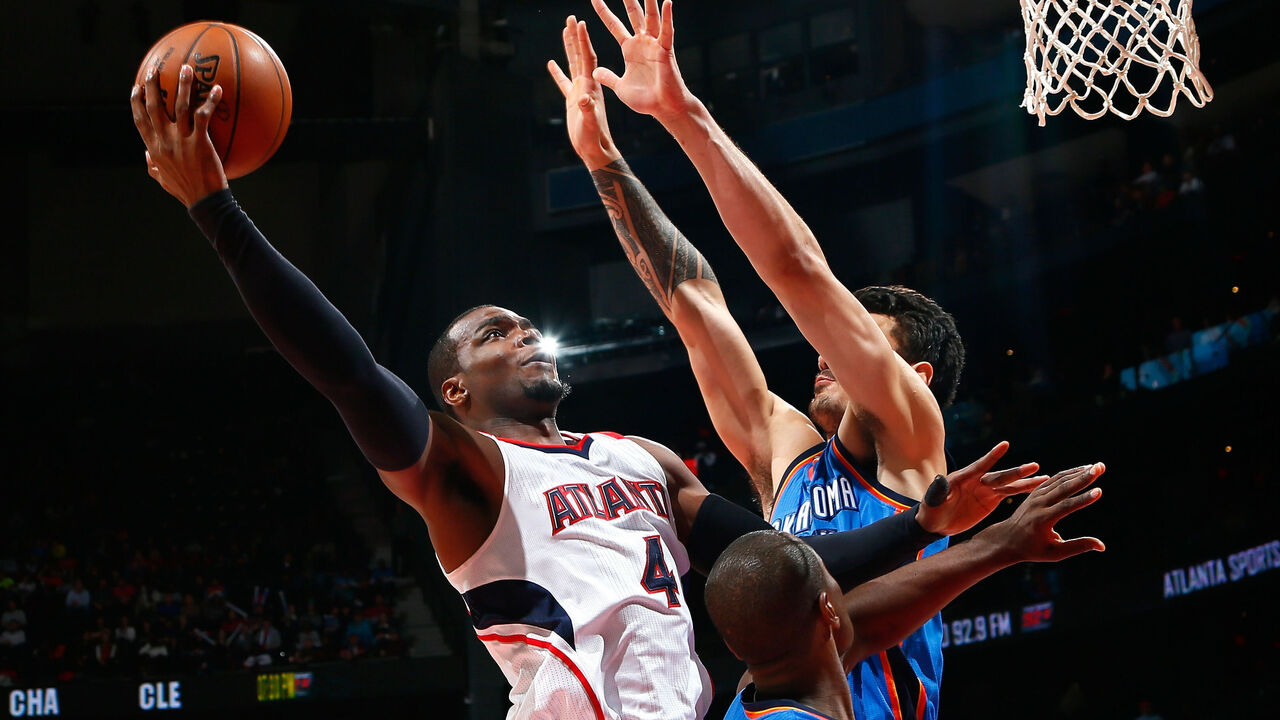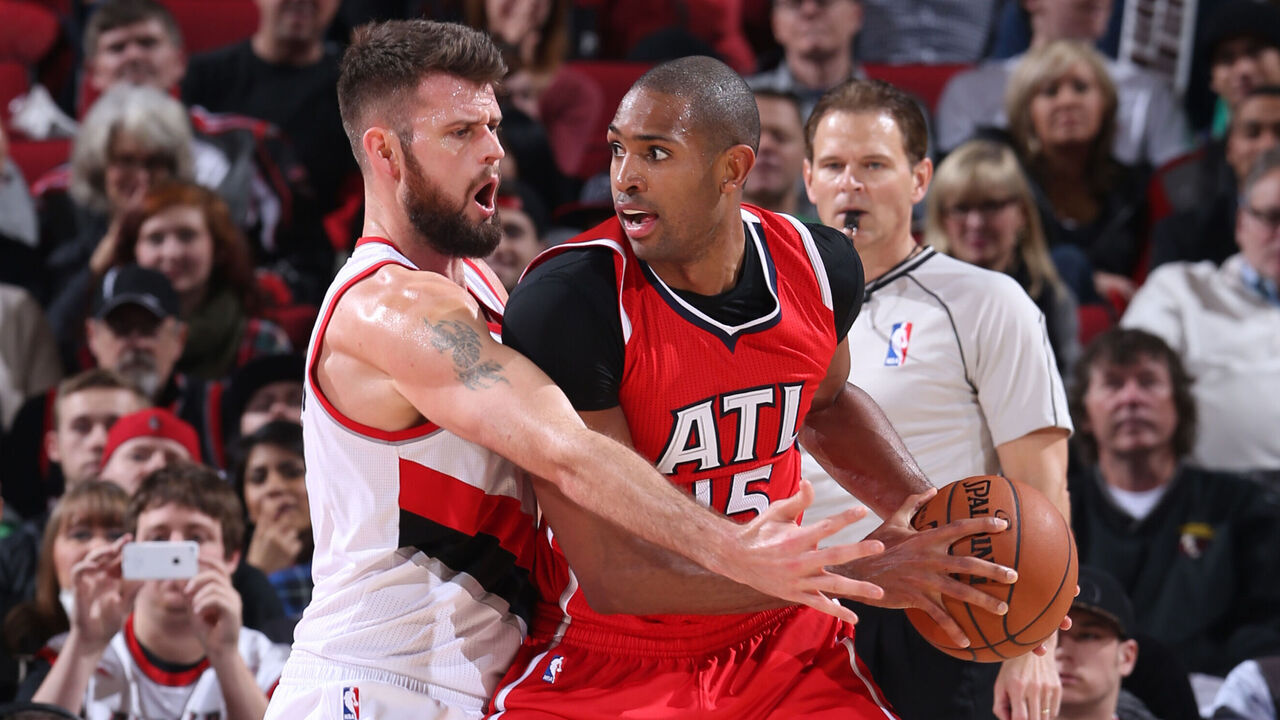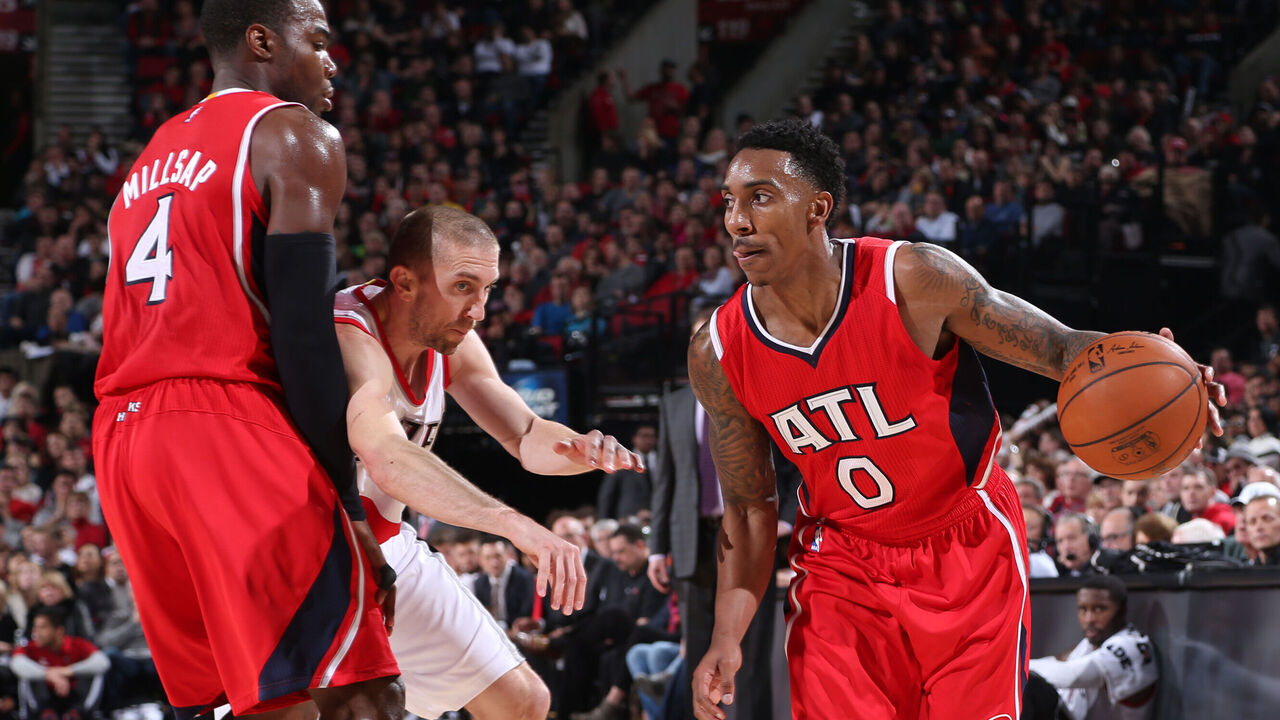How the 2015 Hawks' starting 5 won Player of the Month
It was February 2015, and the Atlanta Hawks had just wrapped up one of the most remarkable months in NBA history.
The Hawks were already red-hot entering the new year, having won 16 of their last 18 games of 2014. That run had left them just a half-game out of first place in the Eastern Conference, with a 23-8 record that they'd compiled without any superstars on the roster. They were powered by a starting lineup of Jeff Teague, Kyle Korver, DeMarre Carroll, Paul Millsap, and Al Horford, who had three career All-Star appearances between them at the time (all courtesy of Horford and Millsap).
With coach Mike Budenholzer at the helm, they ambushed opponents with an aggressive, ultra-connected defense that forced gobs of turnovers. They tied opponents in knots at the other end with a free-flowing, equal-opportunity offense predicated on ball and player movement. But while some intrigue burbled around the team, few observers took the Hawks seriously as contenders at the time. Prevailing sentiment suggested they were a fun team that was bound to cool off.
Then they went out and won all 17 games they played in January, a slate that included 10 playoff opponents, two extended road trips, and four sets of back-to-backs. When it was over, every team in the NBA, including the eventual champion Warriors, was looking up at Atlanta in the overall standings.
"When January hits, I feel like that's usually the most challenging month of the season," says Horford, the lone member of that starting five who's still playing in the league. "We started that month and it was a very tough schedule, but our whole mindset was like, 'Let's just take it a game at a time, see how it goes.' And then midway through the month, we're like, 'Oh, man, we still haven't lost a game!' We just found ourselves in a great groove."
"We was playing so free and so together," Carroll remembers. "We could be up by 20 in the first quarter, or we could be down by 10. We always knew, just because we had that much confidence and that much continuity, that we wasn't gonna lose. And give credit to our coaching staff, they really made us feel that. They even walked around with that type of swag."
When it came time to decide who should be named Eastern Conference Player of the Month, the voting committee - made up of people in the communications and basketball operations departments at the league office - felt compelled to reward someone from the team that hadn't lost during the calendar month in question. But with such a balanced group, singling out an individual for recognition proved challenging.
"When we sat down that week, it was amazing to us," recalls Tim Frank, the senior vice president of league operations communications since 2001. "They went undefeated, and when we looked at the statistics for each of their guys, I think the lowest scoring average was like 15-something and the highest was like 18-something. And our thought was, you can't really tell the monthly story appropriately without the team that went undefeated. But there wasn't one player that really stood out as having monster numbers."

Though the spread in the starters' stats wasn't quite as small as Frank remembers, he wasn't far off. Millsap led the Hawks that month with 18.3 points per game, Horford averaged 17.1 while anchoring the back line of the defense, Teague scored 16.6 while leading the team in assists (8.5) and steals (1.8), Korver averaged 13.4 and shot 57% from three while leading the team in individual net rating (plus-22.2), and Carroll averaged 12.3 on 64% true shooting while taking on the toughest defensive wing assignment every night.
"We just looked at it and our general view was, we should recognize them all, right?" Frank says. "When we first raised it on the call, everybody kind of laughed originally. But ultimately I think we all came to feel it was 100% the right thing to do.
"When we called the Hawks, they were like, 'That is so cool!' I don't even think they had thought that was a possibility."
Last Tuesday marked the 10-year anniversary of that Player(s) of the Month announcement, which was the first and only such award any of the five received. A decade later, in the wake of an exhausting and chaotic transaction cycle featuring all manner of star-centric machinations, there's something refreshing about revisiting that particular month for that particular team, which was honored in a way that hadn't happened before and hasn't happened since.
"You always worry about setting precedents and stuff, but we're 10 years later now, and I don't remember us having any similar conversation since then," Frank says. "We've talked about doing it for two players from the same team or something like that, but this was truly unique. And we thought the Hawks at that time were really unique."
"I just remember being very surprised about it," Horford says. "I mean, that's supposed to be an individual award. But it was so fitting for our group because individually, we could care less about that award. We were just focused on winning games and enjoying playing basketball."
Korver, now the Hawks' assistant general manager, says: "We were just continuing to do the things that we'd been talking about internally for two years, and all of a sudden, we just weren't losing games. It was just, you show up every day, believing individually we're probably not good enough, but if I play to make the person next to me better and he does the same for me, we've got a chance to win. That's every single day and every single game with that mentality.
"In a league where everyone's just trying to stuff their roster with as much talent as they possibly can and then let the pieces figure it out, this wasn't that approach. And it was a beautiful thing. We'd be playing against teams, and I remember guys on the other team at the end of the game being like, 'Man, I love how you guys play.' And that means you're doing something, you know? So that's really what I remember about that month. It was just an affirmation of what we were trying to build."

The particular alchemy that makes a team greater than the sum of its parts is more art than science. You can do your best to match up complementary skill sets and avoid redundant ones, but that doesn't guarantee a harmony of style, personality, or intent. Countless teams have tried to maximize their talent the way those Hawks did, but you can count on one hand the number that have come close. Every team is its own unique organism, and sometimes, for reasons that aren't totally explicable, a group of players just clicks.
"Between Jeff and Al and Paul and DeMarre, we were playing with winks and nods," Korver says. "We didn't have to talk to communicate. We're like, glancing at each other and knowing what the other person's thinking, what we're going to do the next time down the court. Three of us are making eye contact and reading each other's minds, you know? We just felt like we were super in sync. And that's what helped me. Because I've never been a person to just create his own shots. I'm always at my best when I'm with a group that's playing connected basketball."
"The biggest thing was trust," Carroll says. "Trust in the next person to do his job. That's how you build confidence, and that's when everything jells: When I know if I get beat, Al is going to be behind me to protect the rim, and Al, when he's guarding a post-up guy who goes baseline on him, he knows his help's gonna be there. Trust in making that extra pass, knowing everybody's gonna get an equal amount. I think that's the biggest key we had."
"It's really a credit to Coach Bud," Horford says. "He really got us to buy into playing with one another, looking to play the right way, playing with pace. I think it was about Bud challenging us, and us kind of running with it."
One of the unwritten rules of sports is that you aren't supposed to think too much about the magnitude of what you're doing while you're doing it. Like a pitcher in the middle of a perfect game, there's a sense that drawing too much attention to a magic moment will break the spell that created it. Those Hawks were always wary of buying into their own hype. To hear Korver tell it, they lived their hot streak like it was governed by the laws of cartoon gravity: They could walk on air as long as they kept their eyes straight ahead, but the instant they looked down, they'd fall.
"There was always an appropriate fear of, if we break off of this model, we're not good enough to keep winning," Korver says. "I think we were humble enough as a group to understand who we really were and that we needed everyone around us. So, we were always holding, 'Man, we're winning, this is so much fun,' with, 'We know there's other teams that are more talented than we are.' We were holding both of those things at the same time."
As sensible as that approach might've been, it meant the Hawks couldn't fully absorb how special that January - and their collective award - was at the time.
"We acknowledged it, we thought it was cool, but honestly, we just kind of kept it moving," Horford says. "I feel like everybody around us made a big deal out of it, and it was a good feeling, but at the same time, we were just kind of focusing on the next thing."
"I don't think we really celebrated it," Korver says. "We probably should have celebrated it more."
A decade later, that team's imprint still lingers. Almost any time another NBA team takes off unexpectedly, thriving on the strength of continuity, synergy, and fit, people invoke the 2014-15 Hawks. One such team is this year's Cleveland Cavaliers, for whom Carroll serves as an assistant coach.
"It looks like a mirror image sometimes, right?" Carroll says. "This team, I think, shoots a bit better - probably a lot better - than we did. But overall, as far as the confidence and continuity, I definitely feel that (similarity)."
Of course, because of the way that campaign concluded for Atlanta - a choppy last month of the regular season, two grind-it-out series wins over middling teams, and then a sweep by LeBron James' Cavaliers in the East finals - the comparison always feels a bit backhanded. Referencing those Hawks has become a kind of shorthand for the possibilities and limitations of a team devoid of both ego and top-10 talent.
Still, whatever people might say about how it ended, few teams have gone on the kind of run the Hawks did that winter. For a long while, nobody in the league could touch them. And that will always be worth remembering and celebrating, especially by those who were part of it.
"People play this game for lots of different reasons," Korver says. "What's always driven my desire to play and be part of the game is, I just think it's so fun when you're giving everything you have, preparing every single day, putting your full self out there, and it's connected to other people who are doing the same. And to me, in all my basketball years, that was the purest basketball that I've ever been a part of.
"It was never about one person. And I think when that happens in sports, everyone sees it, everyone notices it, everybody wants it. It's really hard to do. And I just think, in a world where the individual is celebrated so much now ... being part of a great team that was recognized and celebrated that way, it's really meaningful for me that that's part of my basketball story."

The impact of those Hawks also continues to resonate with the people who made the decision to reward the team in unprecedented fashion.
"On our calls occasionally it'll still come up," Frank says. "We remember that moment because I think for all of us it was pretty cool too. And at the time I think everybody was curious … if anybody would rip us for it. But it wound up being almost overwhelmingly supported. I mean, even from the media, I don't remember any negativity on it. So, we definitely thought we had done a good thing."
And for the two guys who now work in the league in different capacities, the memories of that team still shape the way they approach their respective roles.
"I wish we could've won, but at the end of the day, man, I think just being around that team and having that experience has helped me a lot, even on the coaching side," Carroll says. "Coaching these guys, I'm always telling them, 'You don't get these opportunities too often. You gotta take advantage.'"
"That is my North Star now," Korver says. "Working in the NBA on this side of the game, obviously you need to have talent, and you never want to just try to copy something else, it never works. But just like, trying to create an environment that reflects a lot of the values and the mindset that that group had, when I felt it and experienced it on a deep level … that's my North Star, for sure."
Joe Wolfond covers the NBA for theScore.